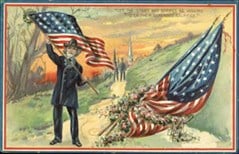Memorial Day provides the political class countless opportunities to ruin an otherwise thoroughly enjoyable holiday weekend. Like clockwork, local congressmen, mayors, city council members, et al. materialize at parades, picnics, and churches to give speeches about “freedom.”
But what does freedom really mean?
Just as we should repudiate Junk English in economics, we should demand precision when it comes to the language of political posturing! In other words, we should insist that politicians use defined terms (I’m not holding my breath).
In essence, freedom is the absence of state coercion. Nothing more, but certainly nothing less.
Dr. Ron Paul explains this coercive reality behind those invoking freedom while advocating state action:
Few Americans understand that all government action is inherently coercive. If nothing else, government action requires taxes. If taxes were freely paid, they wouldn’t be called taxes, they’d be called donations. If we intend to use the word freedom in an honest way, we should have the simple integrity to give it real meaning: Freedom is living without government coercion. So when a politician talks about freedom for this group or that, ask yourself whether he is advocating more government action or less.
Taking this definition a step further, Hans-Hermann Hoppe describes a free society as the absence of aggression against one’s body and property:
A society is free, if every person is recognized as the exclusive owner of his own (scarce) physical body, if everyone is free to appropriate or “homestead” previously un-owned things as private property, if everyone is free to use his body and his homesteaded goods to produce whatever he wants to produce (without thereby damaging the physical integrity of other peoples’ property), and if everyone is free to contract with others regarding their respective properties in any way deemed mutually beneficial. Any interference with this constitutes an act of aggression, and a society is un-free to the extent of such aggressions.
In The Ethics of Liberty, Murray Rothbard similarly defined freedom as the “absence of invasion by another man of any man’s person or property” (italics in original).
This encapsulates the critical libertarian concept of negative liberty, as opposed to the view of positive liberty in the form of mastery over one’s person and surroundings generally favored by “progressives.”
This definition of freedom is fundamental. It means free people should be able to use their minds, bodies, and talents to advance their well-being (whether material, intellectual, or spiritual) as they see fit. It does not mean they can demand freedom from material want, or scarcity, or illness, or unhappiness, or unpleasantness generally. It does not mean anyone owes them housing, medical care, food, or a “living wage.” It means, in sum, the freedom to be left alone. And this is precisely what the political class of all stripes cannot abide.
Reprinted with permission from LewRockwell.com.

